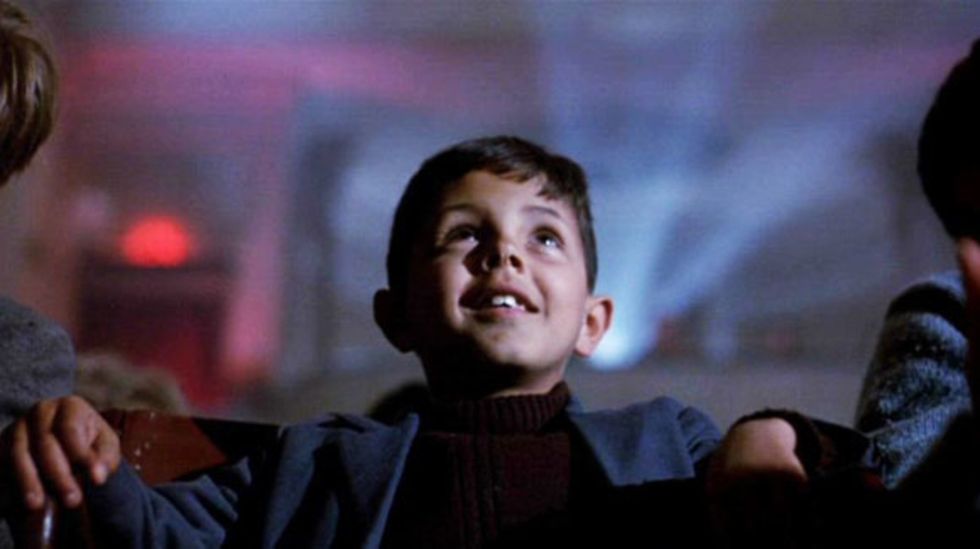In 1988, Giuseppe Tornatore graced the film world with his film Cinema Paradiso. Though it's been on my list of movies to watch for a few years now, I recently sat down and watched it for the first time and instantly fell in love.
Cinema Paradiso focuses on Toto (Jaques Perrin), an Italian filmmaker, who reminisces about his childhood after hearing about the death of his friend. The film is told primarily in a flashback, showing Toto's love of film from a young age into his teens. The first part follows Toto as a child (Salvatore Cascio), and his budding friendship with Alfredo (Philippe Noiret), the projectionist. After several unsuccessful attempts to keep Toto away from the projection room, Alfredo eventually decides to teach the boy about the ins and outs of the projector and film, creating a launching point for Toto's love of film. As a teenager (Marco Leonardi), Toto finds his second love, a beautiful young woman named Elena (Agnese Nano), who occupies as much space in his mind as film does.
What's so beautiful, and what I found most intriguing, about Cinema Paradiso is that it's a love story, but regardless of the story between Elena and Toto, it's not a love story focused solely on two people; rather it's about the love and appreciation of film, and the enchanting qualities of the movies. It's about growing up while keeping your youth, and finding something you're passionate about that helps you stay young at heart.
The film also focuses on the love between Toto and Cinema Paradiso, the local movie theater, which arguably dominates over that of Toto and Elena. Many of the events of the film happen at the theater or in the square where the theater lives. It creates a place for the community to disconnect from their lives and enjoy movies together, kids and adults. During a screening, the film strip catches in the projector, causing a fire that ruins the theater. Alfredo, caught in the flames, loses his vision as a result. While the event is heartbreaking at first, it creates new life for the movie house. It's rebuilt and renamed Nuovo Cinema Paradiso. Toto takes Alfredo's place as projectionist, and the movie itself goes from Toto as a young boy to his teenage years, where he finds Elena. The rebuilding opens a new chapter for everyone in the film, including the theater.
Near the end of the film, 30 years later, Toto returns to his hometown. He finds the theater run down and abandoned. He learns that a demolition crew will knock down the theater to make room for a parking lot. For me, the total destruction of the theater was an incredibly sad moment. A place that had been its own character reached the end of its life, and gave a finality to its demise. In one part of the film, Toto decides to leave home, and Alfredo tells him never to return or look back. The demolition of the Nuovo Cinema Paradiso is a sad, but also symbolic.
Now, I can't completely disregard the relationship between Toto and Elena. In their teenage years, their relationship almost seems as though it won't happen--but of course it does. However, Elena's parents don't approve of Toto, and their relationship becomes partially secretive so that they can stay together. Eventually she goes away for college, and what later turns out as a major miscommunication, the two lose touch. In the end, they meet again as adults in a bittersweet scene where they clear up everything they felt or thought went wrong when they were kids. In the grand scheme of things, their meeting was fleeting, but it resolved past disappointments in a perfect way.
I went into Cinema Paradiso knowing it was partially considered a "romance" film, most likely because of the Toto/Elena story. For me, the romance and the heart of the film transcends their love. It shows how the passion someone has for something can become just as real as another person. The passion in the film and surrounding it created an incredibly satisfying experience, and one that proves the power of film itself.






















